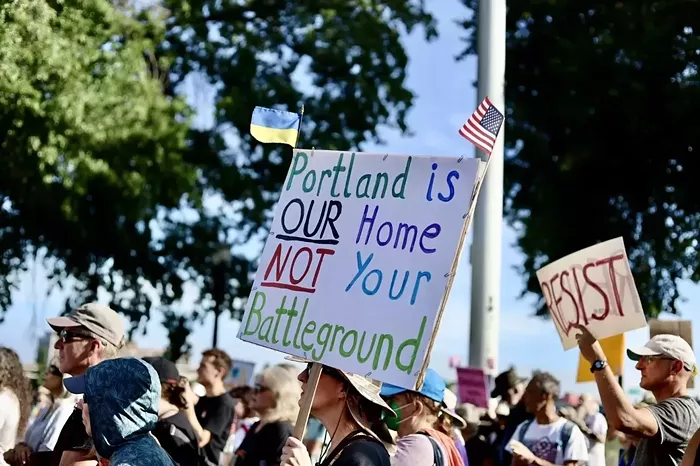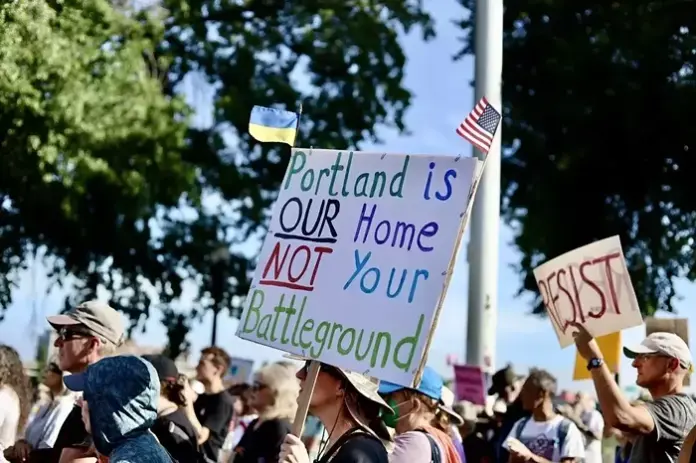This post was originally published on this site

Editor’s Note: This story originally appeared in our sister publication, Portland Mercury. We will be posting dispatches from Portland as they become available.
The Oregon Attorney General’s Office is requesting a review by a full appeals court after the US Court of Appeals for the 9th Circuit ruled Monday that President Donald Trump can deploy the National Guard in Portland.
The 9th Circuit ruling paves the way for the federal government to occupy the city.
The ruling, handed down more than a week after the court heard oral arguments from attorneys for the Department of Justice and the state of Oregon, is a legal success for the Trump administration, after courts have blocked or slowed its efforts to occupy other major cities like Los Angeles and Chicago.
In a statement following the ruling, Oregon Attorney General Dan Rayfield, a Democrat, called for the full 9th Circuit to intervene to stop the deployment of troops on city streets.
“Today’s ruling, if allowed to stand, would give the president unilateral power to put Oregon soldiers on our streets with almost no justification,” Rayfield said. “We are on a dangerous path in America.”
Rayfield, along with Governor Tina Kotek, vowed to continue fighting the decision in court. Attorneys for the state of Oregon filed a request for the case to be quickly reconsidered by a full appeals court. Monday’s ruling was decided by a panel of three judges.
Meanwhile, National Guard troops are temporarily restricted from deploying, pending a district court’s decision on a temporary restraining order that remains in effect until next Wednesday. The US Department of Justice on Monday requested that restraining order be dissolved by the judge who issued it, arguing the 9th Circuit ruling should supersede that of the district court.
The 9th Circuit for years had a reputation as one of the country’s most liberal appeals courts, but two of the three judges who heard attorneys’ arguments in the case were Trump appointees—and their votes were decisive in the court’s 2-1 ruling.
The majority opinion holds that the Trump administration’s presentation of Portland as dangerous enough to warrant federal intervention is credible, even if “the President may exaggerate the extent of the problem on social media.”
“We conclude that the President’s assessment of the situation in Portland—specifically, the threat to federal personnel and property, and the resulting inability to execute federal laws— ‘reflects a colorable assessment of the facts and law within a ‘range of honest judgment,’” the opinion reads.
The writing was on the wall for the state during oral arguments earlier this month, when the two Trump-appointed judges pushed back against the state’s presentation of the protests at the ICE facility on S Macadam Ave as largely peaceful.
Much of the discussion in court centered on the question of how dangerous recent protests in Portland have been and whether they constitute a “rebellion,” with the state and the federal government taking drastically divergent positions.
Stacy Chaffin, the attorney representing the state, said Trump’s depiction of Portland as “war ravaged” was “untethered from reality” and maintained that local law enforcement has capably handled what little criminal activity the city has seen in recent weeks and does not require federal assistance.
“The situations that we’re talking about, even the situations where it unfortunately could include an assault on a federal officer, that’s a crime. That’s a crime that was handled. They were arrested,” Chaffin said during the hearing. “That’s how this process is supposed to work. It’s not that there is a protest, and then you just send in the military. This is protected speech, and for the most part, it is calm and sedate.”
Recent protests at the ICE building have mainly been small and mainly nonviolent. But Eric McArthur, the deputy attorney general representing the federal government, argued they have involved property damage and constitute a rebellion that necessitates a guard presence.
In making his argument, McArthur’s rhetoric about the protests hewed closer to Trump’s.
“This is hardly the peaceful and sedate crowd that plaintiffs tried to make it out to be,” McArthur said in closing. “These are violent people. And if at any point we let down our guard, there is a serious risk of ongoing violence.”
McArthur suggested the pressure from protestors has left Trump with little choice other than to send in federal troops.
“At some point, the president is entitled, when his subordinates are telling him, ‘We are overstretched, this is unsustainable,’ the officers aren’t available to do their jobs, they’re not available to surge to other places where we face violence, the president is entitled to say ‘enough is enough,’ and bring in the National Guard to reinforce the regular forces,” McArthur added.
The judges seemed inclined to agree, pressing for details about the nature of the protests and pushing Chaffin to clarify the state of Oregon’s position on when it is appropriate for courts to intervene to block the president from deploying federal troops—suggesting that events from the summer may be grounds enough for Trump to send in troops.
“The president gets to direct his resources as he deems fit, and it just seems a little counterintuitive to me that the city of Portland can come in and say ‘No. You need to do it differently,’” Judge Ryan Nelson said at one point.
Their ruling is just the latest development in a battle over the legality of the Trump administration’s attempt to deploy federal troops to Portland.
On September 27, Trump announced in a Truth Social post that he was directing Pete Hegseth, the Secretary of Defense, to “provide all necessary Troops to protect War ravaged Portland” and that he was authorizing “Full Force, if necessary,” in the city. Hegseth then federalized 200 members of the Oregon National Guard for a period of 60 days.
The state of Oregon, in response, sued to block the Trump administration from deploying the National Guard troops in Portland—arguing that, contrary to the president’s rhetoric, the city was peaceful and such a deployment would under the circumstances violate the state’s sovereignty.
A federal judge agreed, and granted the state a temporary restraining order barring the Trump administration from deploying Oregon National Guard troops in Portland through October 18.
The Trump administration, in response to that legal setback, decided to deploy another state’s National Guard troops to the city instead—sending 300 members of the California National Guard to Portland.
That workaround was also quickly blocked by the same judge, US District Judge Karin Immergut, a Trump appointee, who issued a second restraining order preventing the Trump administration from sending National Guard troops from other states to Portland.
The Trump administration appealed Immergut’s ruling, which landed the state and the federal government back in court.
Before Monday’s decision, National Guard troops were forced to wait for further developments at posts outside the city they were barred from entering. Members of the Oregon National Guard were stationed at Camp Rilea in Warrenton, while members of the California National Guard were biding their time at Camp Withycombe on the outskirts of Happy Valley. Guard troops were later sent home, pending legal decisions.
Portland is not the only place a major court case over the president’s use of National Guard troops is currently playing out. The 7th Circuit has blocked the Trump administration from deploying federal troops in Chicago, a decision the Trump administration has appealed to the Supreme Court.
The ongoing battles in Portland and Chicago could have grave consequences for the practice of federalism and states’ rights, as both cases have turned on the question of how much latitude the president has to deploy the US military to American cities over the objections of their local elected leadership.
Illinois Gov. JB Pritzker has characterized the presence of federal troops in Chicago as an “unconstitutional invasion of Illinois” by the federal government, while Oregon Gov. Tina Kotek called the deployment of Texas National Guard troops to the state “un-American” and said she is fighting for “the right to govern ourselves.”
Trump yesterday called for the arrest of Pritzker and Chicago Mayor Brendan Johnson. The administration has also sent National Guard troops to Los Angeles and Washington, D.C. in recent months.
As the 9th Circuit was hearing arguments earlier this month, Kristi Noem, the secretary of Homeland Security, told a Trump cabinet meeting that her department is looking to purchase more facilities in Portland and threatened to expand the federal law enforcement presence in the city if local elected officials do not cooperate with the administration.
“We’re going to double down,” she said.



















